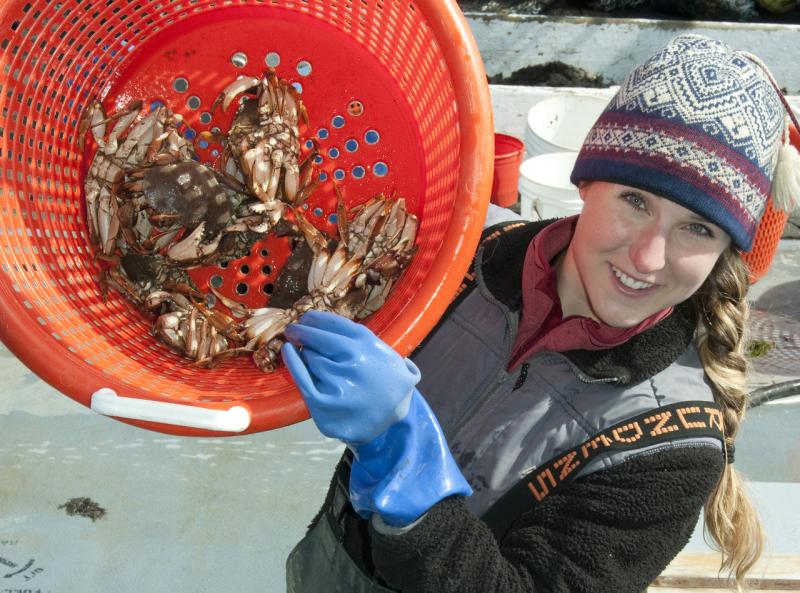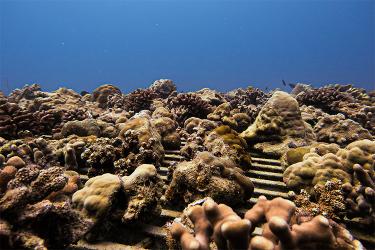Anna Mercer is all about diversity: in life, work, interests, and people. She is the new chief of the Northeast Fisheries Science Center’s Cooperative Research Branch and arrives with an already impressive resume. It’s filled not only with a range of marine science accomplishments, but also substantial experience in connecting science to the people to whom, and places where, sustainable fisheries matter.
“I come into this job with an open mind and some clarity on ways the program can improve. I have worked alongside people from this branch for years and look forward to being a part of it,” says Mercer. “The hardest thing is to find ways to ensure that cooperative research results get used in a meaningful way. Building and maintaining sustainable fisheries is a lifelong effort, and I believe cooperative research is a big part of making that effort successful.”
Cooperative research started to take shape as a formal program for NOAA Fisheries in the northeast during the 1990s. Disaster relief funding provided for northeast groundfish fishery failure was used in part to compensate groundfish businesses for participating in research that addressed the failure. The program is now a multi-million-dollar effort focused on a variety of fishery challenges, from bycatch to better and easier catch reporting to industry-based at sea data gathering and research that spans fisheries and topics.
“Science that is going to affect people’s lives is really what is attractive to me,” says Mercer. “If I am working to sustain fisheries, I am doing science that matters."
Mercer grew up in Maine in an active, outdoorsy family and found herself out and about in nature at an early age. Water held a particular attraction. “As soon as I could walk and be by myself, I was right down to the water.” First it was riverside, but once family time was spent on the rocky Maine coast, she was hooked. “They had to drag me out of the tide pools,” she says. A good student who gravitated naturally to understanding how the natural world works, she “immediately knew that my career was going to be in marine science.”
Mercer earned a bachelor’s degree in marine biology from the University of New Hampshire. Moving on to doctoral study at the University of Rhode Island’s Graduate School of Oceanography, she thought long and hard about how to focus her broad interests.
Graduate school provided ample opportunity to spend time at sea on fishing vessels, collecting data and doing research. “It’s always the unexpected experiences at sea that are the most exciting and that you remember, whether they are science related or not.” From close encounters with electric torpedo rays to figuring out what to do when the trawl brings up a 3,000-pound boulder that sea-anchors the boat, to getting her hand stuck in a monkfish’s gullet, she has a load of interesting sea tales.
“My work usually involved day-trips, but we all know those are long days, and I was often the only woman and sometimes the only scientist. I have to say I was never made to feel that made much of a difference,” she recalls.
Since earning her doctoral degree in biological oceanography, Mercer has been immersed in cooperative and collaborative work with the fishing industry. “I have always been at my best when I work directly with the fishing community as well as other scientists” she says. “Where I get excited is when the problem needs a diverse scientific approach to make a difference.”
Mercer has worked on at-sea monitoring of marine life and habitats, underutilized species market development, bay scallop research and management, ocean productivity surveys, intertidal and tropical ecology, coral reef fisheries, invasive species, and artisanal fishery development. More recently, Mercer has spearheaded research focused on enabling fishermen to collect quantitative biological and environmental data in an efficient and effective ways that pays off in valuable scientific data.
When asked about people she might like to give a shout-out to for helping her achieve so much, Mercer is a bit daunted. “There are so many!” she says. Among the most important however, is the board of directors for the Commercial Fisheries Research Foundation, an organization she has been involved with for the last decade in one role or another, most recently as executive director.
“They took me in as a one of their own. They helped me grow professionally and personally. They understand the really complex world that is commercial fishing, and supported me as I developed collaborations that help us all do better and more effective work.”
Mercer’s appointment creates the first all-female leadership team within the Northeast Fisheries Science Center. She joins division chief Amanda McCarty and fellow branch chief Amy Martins, who manages the sprawling fisheries sampling branch, encompassing a variety of monitoring programs that collect data directly during fishing trips.
“One reason I am excited to take on this position and to help the Cooperative Research Branch make progress is that I have two young daughters. I want to make sure they and other young women I meet have a role model and an example of how women can be effective in STEM fields as well as in leadership positions; to encourage them to feel there is nothing holding them back from achieving their dreams.”
Mercer says that she is still a Mainer at heart, but also admitted to recently giving up her phone number with a 207 area code. She and her family will continue to make Rhode Island their home.



